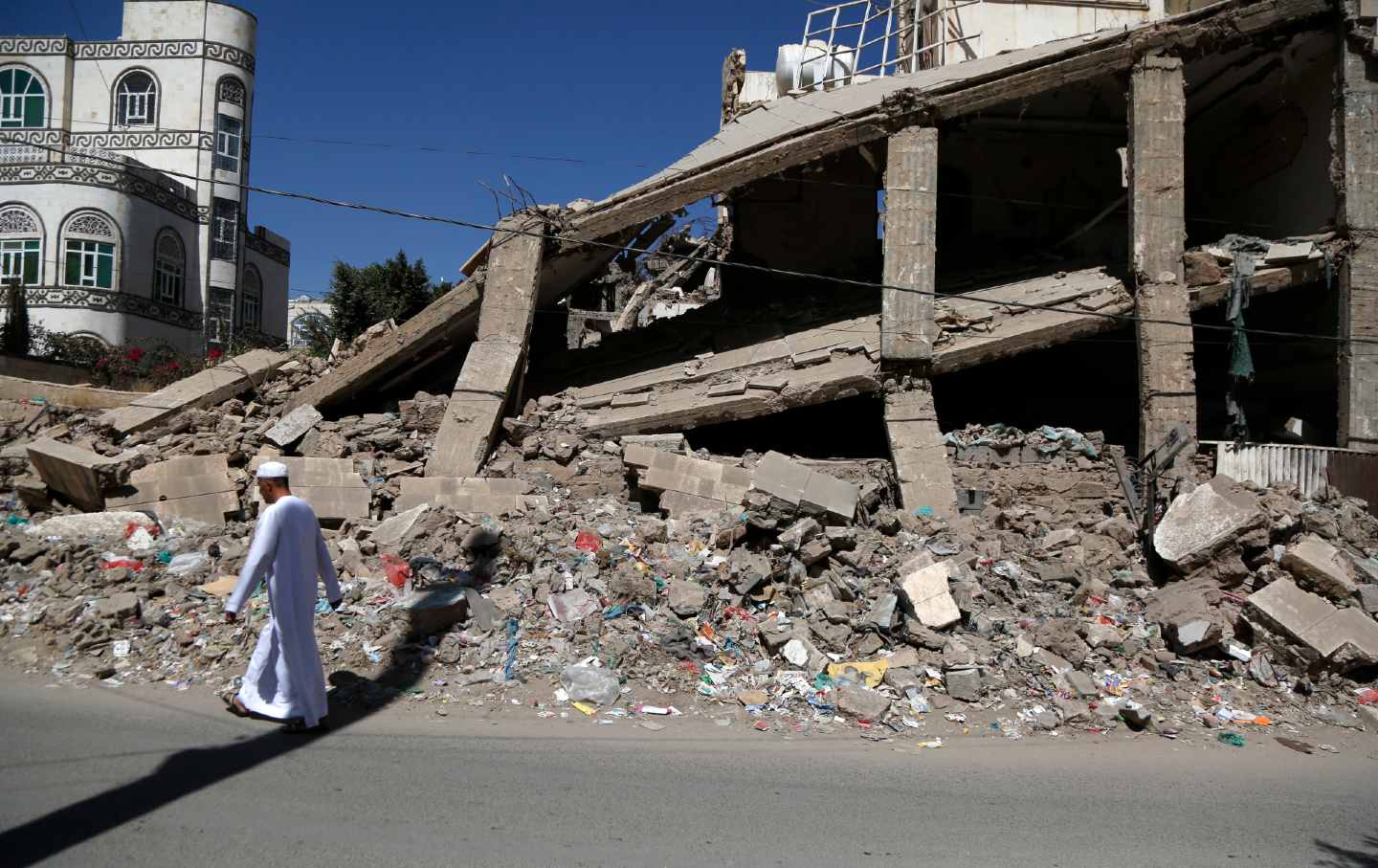
A Yemeni man walks by a house that was destroyed in an air strike carried out during the war by the Saudi-led coalition’s warplanes, on February 5, 2021, in Sanaa, Yemen. (Mohammed Hamoud / Getty Images)
On March 26, 2015, a coalition led by Saudi Arabia and the United Arab Emirates launched an ill-fated war on Houthi-led rebel forces in Yemen, inaugurating what the United Nations has described as the world’s worst humanitarian catastrophe. Mohammed bin Salman, or MBS as he’s known, the architect of the Saudi war effort, asserted that it would be a short conflict, with a swift Saudi victory. The Obama administration, which apparently believed MBS’s claims, supported the war effort with tens of billions of dollars in arms sales and logistical support. Six years later, bin Salman’s prediction of a short war seems like a cruel joke, and the continued US role in supporting the Saudi/UAE coalition is unconscionable.
Nearly a quarter of a million people have died since the start of the Saudi/UAE intervention because of indiscriminate air strikes, a punishing blockade, and preventable diseases resulting from the destruction of civilian infrastructure and a shortage of medical supplies. As a recent report from CNN has documented, the blockade continues to this day, preventing the import of crucial fuel supplies that have left hospitals struggling to operate and impeded the delivery of essential humanitarian aid. David Beasley, the head of the UN World Food Program, underscored the scope of the crisis: “I can’t say this enough: Once a famine has arrived, we’re too late. Without urgent intervention in Yemen this year, we risk losing a child every 75 seconds.”
The Biden administration started out on a promising note with respect to Yemen. In his first foreign policy speech, the president said that the United States would cease its support for offensive operations in Yemen and stop relevant arms sales. The administration has since paused two bomb sales to Saudi Arabia and ordered a review of US arms exports to Saudi Arabia and the UAE. But much more needs to be done, and soon. For starters, Biden should suspend all US arms sales to Saudi Arabia and the UAE until the end of the blockade, support a durable cease-fire, and engage in an inclusive peace process that brings an end to the war, as called for by more than 80 organizations and individuals in a February letter to the administration.
Cutting off logistical and maintenance support for the Saudi armed forces would be a particularly effective way to convince the Saudis to end their role in Yemen’s suffering. As Bruce Riedel of the Brookings Institution has noted, the Royal Saudi Air Force would be grounded in short order without this kind of assistance from the United States. Discontinuing this support would send a stern message to Riyadh to end its reckless actions, which Representative Ted Lieu (D-Calif.) has said “look like war crimes to me.”
While Trump offered a particularly warm embrace to the Saudi regime and its de facto leader, MBS, the Obama administration bears responsibility as well. Trump blocked congressional efforts to cut off the sale of bombs and other equipment to Saudi Arabia, arguing that American jobs and profits for companies like Raytheon, Boeing, and Lockheed Martin were more important than Yemeni lives. He stuck to this immoral and counterproductive policy even after the brutal murder of Saudi journalist and US resident Jamal Khashoggi. But the Obama administration notified Congress of over $115 billion in potential arms sales to Saudi Arabia during its two terms in office, including combat aircraft, attack helicopters, bombs, and missiles that are now being used in the war in Yemen. Former Obama officials, many of whom are now in the Biden administration, have since expressed regret for their administration’s support of the Saudi war effort. Now is their chance to do something about it.
United Nations Special Envoy for Yemen Martin Griffiths has spelled out what needs to be done in the short term to reverse the devastation in Yemen: “A nationwide cease-fire, along with the opening of the Sanaa airport and ensuring the unhindered flow of fuel into Yemen are urgent humanitarian imperatives.” The Saudi government has made an overture that would involve a partial lifting of the blockade, contingent on steps by the Houthi coalition. How serious this plan is, and whether it will eventually lead to lifting the blockade in its entirety, remains to be seen. As Hassan El-Tayyab of the Friends Committee on National Legislation has noted: “The Biden administration must pressure Saudi Arabia to unilaterally end its blockade on Yemen as a humanitarian act, independently of negotiations between the warring parties. Connecting lifting the blockade to ongoing talks is a recipe for prolonging the suffering of the Yemeni people.”
The Biden administration should use all the tools at its disposal to press the Saudis to make a comprehensive, unconditional lifting of the blockade, even as it pushes Saudi Arabia and the UAE to work toward a durable, inclusive peace accord to end the war. After six years of war, Yemen can’t wait.
William D. HartungTwitterWilliam D. Hartung is a senior research fellow at the Quincy Institute for Responsible Statecraft.